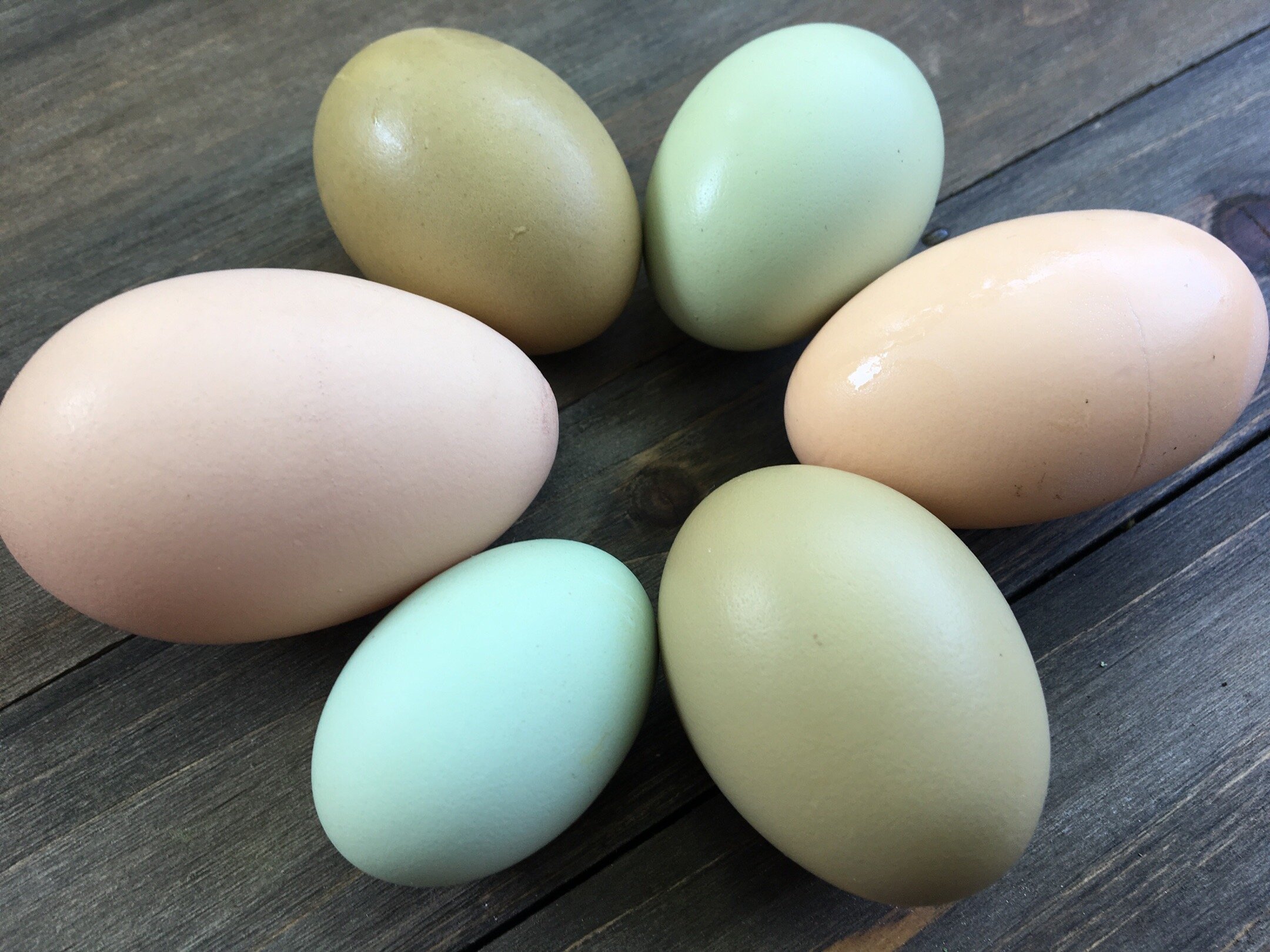How to Wash Farm Fresh Eggs--Or is it Better Not To?
Washing fresh eggs is one of those hotly debated topics that most people seem to be either adamantly for or against. Let’s look at a few facts to figure out if washing eggs is a good idea or not.
First Some Facts
There are a few things we know about chicken eggs that are true. Let’s take a look.
Egg shells are made up of mostly calcium carbonate crystals. This means that even though eggs look solid they can actually have as many as 8,000 pores in them. Those pores are perfect for allowing bacteria inside.
The good news is, right before an egg is laid, the chicken coats the egg with a protective coating called the “bloom”. (Fun fact: the bloom is also where the majority of the egg color comes from.)
The bloom helps keep bacteria, moisture, and gases out of the egg. It also keeps the egg fresher longer and unwashed eggs with the bloom still intact are able to sit out on the counter for several weeks without going bad. (That’s how they do it in Europe!)
The bloom can easily be washed off with water, and once it has been, the egg is no longer protected from bacteria, moisture, and gases because the pores have been exposed.
Okay, well all those facts may be fine and well, and seems to point to unwashed eggs being a good choice, but what about salmonella? Glad you asked!
Let’s take a look at what Backyard Poultry has to say:
The biggest health risk associated with eggs is being exposed to Salmonella bacteria. Most types of Salmonella grow in the intestinal tracts of animals and are passed through their feces. Most humans become infected with Salmonella after eating foods that are directly or indirectly contaminated with animal feces. With chicken eggs, the eggshell is exposed to Salmonella usually after the egg has been laid as a result of poor animal management practices (i.e. the bird is living in a feces infested condition) and not necessarily from backyard chickens.
Hopefully, if you have chickens and you properly care for your chickens you should A) have healthy chickens free of disease and B) keep your coop clean which will result in very few dirty eggs. Which pretty much eliminates the salmonella issue!
I would also like to point out that in pretty much any other country besides the United States even their commercial eggs remain unwashed. In fact, in some cases, it’s illegal to wash commercial eggs. Ironic, right? Although possibly not surprising—we Americans are a bit germaphobic!
Now for a little science
Did you know that when you wash eggs in cold water it actually creates a vacuum effect and it pulls bacteria into the egg? Eww.
Bringing it all Together
By looking at all these factors makes it pretty obvious that you really don’t need to wash your eggs if they come from healthy chickens! So proper coop management is key! (Keep in mind I’m talking about home use for eggs—if you sell your eggs you might have laws regulating that they be washed.)
However, there are a few scenarios we may want to take into consideration such as—
What if there are chunks of chicken crap on my eggs?
We all know, that as hard as we try, chickens are barnyard animals and there WILL be times you get dirty eggs!
In those situations it’s recommended that instead of washing the poop off with water you take a little scrubber and scrub the poop off. Such as using one of those green scratch pads. Keep it away from your dishes, and only use it for chicken poop.
Still weirded out by unwashed eggs?
Yep. I get it. I’m not even really a germaphobe and I still can’t bring myself to use unwashed eggs for the most part. If that's you too, then at least wash them the correct way!
How to wash eggs the right way
Keep your eggs unwashed until right before using them. Then run the tap water until the water is very warm (the water must be warmer than the egg to keep it from doing it’s vacuum thing.) I’m told that the water should be at least 20°F warmer than the egg or at least 90°F. I don’t really worry about the temperature so much, just as long is the water is much warmer than the egg! With the warm water running quickly wash your egg off and use immediately.
And about that refrigeration thing. Yes, you absolutely can leave unwashed eggs on the counter for a significant amount of time. However, I still prefer to store my eggs in the fridge to make them last even longer. You can usually find a cute little basket of eggs on my counter for daily use, though.
Definite NO NO’s
Now let’s go over a few things that you definitely don’t want to do if you wash your eggs. Keep these in mind and you should be golden.
DON’T wash in cold water
DON’T soak your eggs in water—even if you have really stubborn poop. As mentioned above, the water washes the bloom off and opens the egg up to bacteria. Use the scrubby and a little elbow grease. (Again—no water!) If it’s particularly bad, it might be best to scramble that egg up by itself and feed it back to the chickens.
DON’T wash your eggs with soap, or bleach. Because the eggs are porous those can also be sucked into the egg. I don’t know about you, but I don’t want to eat bleach! (Again, if you sell eggs, this may not apply to you. You’ll have to look into the rules of your state.)
DON’T allow your eggs to stay wet. If you wash them ahead of time (which I don’t recommend) at the very least dry them off thoroughly before placing them back in their carton. Water + Pourous eggs = bacteria able to soak in.
I think that about sums it up! I think it’s almost crazy how complicated we’ve made this whole thing of washing eggs. What are your thoughts. Do you wash eggs or no??
Other Resources
If you want to check out some more light reading on this topic, here are a few other articles, and a few video as well on cracking eggs the right way. Enjoy!
Backyard Poultry—Wondering How to Wash Fresh Eggs?
My Pet Chicken—What is the Best Way to Wash and Store my Eggs?
How to crack an egg the right way—VIDEO
How to Crack an Egg One-Handed—VIDEO




